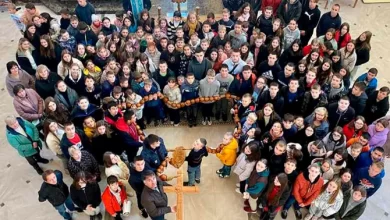Church in Colombia to collaborate with government in search for remains of ‘disappeared’

 The flag of Colombia. / Politicnico Grancolombiano Departamento de Comunicaciones via Flickr (CC BY-NC 2.0)
The flag of Colombia. / Politicnico Grancolombiano Departamento de Comunicaciones via Flickr (CC BY-NC 2.0) ACI Prensa Staff, Jul 4, 2023 / 10:00 am (CNA).
The Colombian Bishops’ Conference (CEC) will formally collaborate in the search for disappeared persons as a result of the guerrilla warfare in the country. Their remains could be in common graves or buried in cemeteries but without having been identified.
In Latin America, someone who “was disappeared” means that the person was kidnapped and very likely killed, whether by organized crime or by left-wing or right-wing forces.
According to the Colombian government’s National Center for Historical Memory, between 1958 and 2012 (the year peace negotiations began), the armed conflict in the nation resulted in the deaths of 218,094 people, of which 177,307, or 81%, were civilians and 40,787, or 19%, were combatants. In addition, 27,023 people were kidnapped.
Monsignor Héctor Fabio Henao Gaviria, the CEC delegate for church-state relations, made the announcement after a meeting held June 27 with the director of the government’s Unit for the Search for Disappeared Persons (UBPD), Luz Janeth Forero Martínez.
Also present at the meeting were the president of the CEC, Archbishop Luis José Rueda Aparicio; the vice president, Archbishop Omar Sánchez; the secretary general, Bishop Luis Manuel Alí; and the bishop of Soacha, Juan Carlos Barreto.
“In Colombia, 104,000 families are searching very intensively for their disappeared loved ones during the armed conflict,” Henao explained, speaking from the conference’s headquarters in Bogotá.
The CEC delegate for church-state relations pointed out that with this effort they wish to “respond to a humanitarian need that affects so many families throughout the country and that represents a deep mark on the life, on the psychology of people in their community lives.”
The UBPD said that “the Church is essential for the search” in remote places, thanks to its institutional presence in different regions of the country through the priests, religious congregations, and pastoral workers who serve these communities on an ongoing basis.
Henao explained that “a joint effort can be made” to find the disappeared persons in the “parishes or dioceses that have cemeteries under their responsibility or property where unidentified people may be buried.”
UBPD teams have also identified 7,600 sites of mass graves in the country.
The CEC delegate for church-state relations pointed out that there is also ongoing humanitarian work to accompany relatives to inform them and get access to scattered graves in some territories or informal cemeteries created within the context of the armed conflict.
The principal rebel groups fighting for the overthrow of the government were the Revolutionary Armed Forces of Colombia (FARC) and the National Liberation Army (ELN). Although the government and FARC, the largest rebel group, signed a peace accord in 2016, elements of FARC that rejected the accords are still operational, mainly dealing in drug trafficking. The ELN has never made any peace deal although efforts at talks continue.
This story was first published by ACI Prensa, CNA’s Spanish-language news partner. It has been translated and adapted by CNA.






